Harvest Fund Management is one of first Chinese asset managers committed to ESG investing. The firm has developed an innovative framework designed to integrate low-carbon investment strategies and capture long-term alpha opportunities in China.
This case study from Harvest Fund Management supports the CFA Institute report "Climate Change Analysis in the Investment Process."
Introduction
As one of the first few Chinese asset managers committed to sustainable investment and environmental, social, and governance (ESG) integration, Harvest Fund Management Co., Ltd. has been proactively researching and acting on long-term sustainability-related investment risks and opportunities to address climate change. We officially became a Principles for Responsible Investment (PRI) signatory in March 2018 and established the largest dedicated ESG research team in the region, with experienced ESG experts based in Hong Kong and Mainland China. The team is responsible for ESG integration, research, strategy development, and stewardship activities. Our sustainable investment approach is shown in Figure 1.
Figure 1. Harvest’s Approach to Sustainable Investment

Source: Harvest Fund Management.
Climate-related issues have always been a critical part of our proprietary ESG integration and research framework and are playing an increasingly important role given the rapid advancement of climate policies and carbon neutrality ambitions globally and locally. We also regularly conduct extensive training on climate change and investment implications to build capacity among investment teams ahead of the regulatory curve.
Following China’s carbon neutrality pledge in September 2020, we established a group-wide research project led by our CEO that focuses on the pathways to carbon neutrality and how to formulate Harvest’s low-carbon investment roadmap for the next 5–10 years. With participation from all key investment teams—including equity research and investment, fixed-income research and investment, asset allocation, and ESG research—this project aims to conduct in-depth research into climate change topics from both top-down and bottom-up perspectives and to revamp Harvest’s long-term strategic asset allocation plan, investment research and investment framework, and processes to incorporate climate change risks and opportunities. So far, comprehensive research and an overview of global and local policies and impacts have been completed. With collaboration from investment analysts and ESG analysts, we also are digging in to sector-level and equity-level analysis focused on various key sectors, including energy, power, chemicals, construction materials, and transportation.
Innovative Data and Product Solutions Contributing to Low-Carbon Transition
Our innovation spans from an ESG scoring system embedded in an intelligent investment platform to in-depth research and fund products. As shown in Figure 2, Harvest has developed its proprietary ESG framework that enables ESG evaluation across the A-share market.
Figure 2. Harvest’s Proprietary ESG Research Framework for the China Market
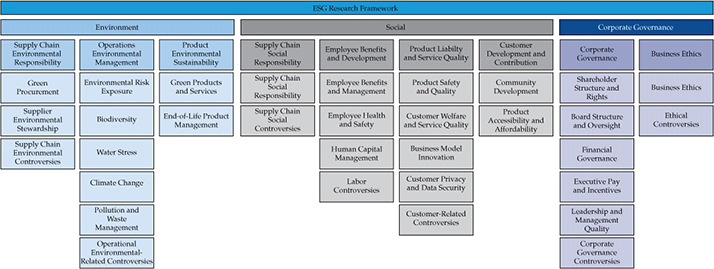
Source: Harvest Fund Management.
• Database and platform
— Established artificial intelligence-based ESG and climate change data and scores covering entire A-share market, integrated in mid-2020 into Harvest’s centralized investment platform, which is accessible by all investment teams. Quantifiable ESG metrics and data points were launched on external financial data terminals, such as Wind, in July 2020 to facilitate wider adoption of ESG and climate change considerations in the investment community, which was highly appreciated by institutional investors focused on the China market and ESG issues.
• Deep-dive thematic research
— Internal industry scorecard and materiality framework incorporating the assessment of the materiality and impact of climate change risks and opportunities, based on the Task Force on Climate-related Financial Disclosures (TCFD) framework and local green/climate finance policies.
• Fund product innovation
— Active investment: We launched a low-carbon thematic equity fund (001616.OF) on 31 December 2015.
— Passive investment: The Harvest CSI 300 ESG Leaders Index Exchange-Traded Fund (ETF) launched in March 2021, contributing to the low-carbon transition.
• Outlook and future plans
— From the local asset manager’s perspective: Develop more low-carbon strategies to enable the low-carbon transition and capture long-term alpha opportunities in China.
Example: Reducing Carbon Footprint through the Harvest CSI 300 ESG Leaders Index ETF
Harvest CSI 300 ESG Leaders Index ETF showcases our efforts to reduce our carbon footprint.
Reduce Carbon Footprint and Support China’s National Commitment to Carbon Neutrality
The Harvest CSI 300 ESG Leaders Index ETF, or Harvest ESG Leaders for short, provides higher exposure to green revenues in carbon-intensive sectors. As shown in Figure 3, Harvest ESG Leaders has a far higher percentage of average green revenues in utilities, energy, and industrials sectors, as well as the overall portfolio, compared with its benchmark CSI 300.
Figure 3. Average Green Revenue, FY20, %
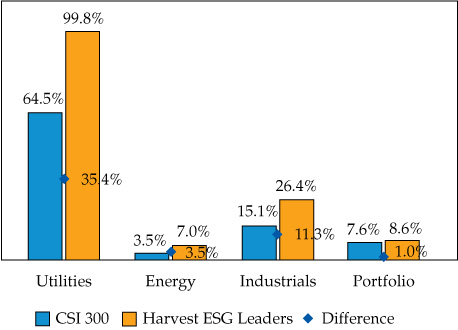
Source: Harvest Fund Management, based on index constituents as of 30 June 2021.
Focusing on the energy sector, Figure 4 shows that the index significantly cuts carbon footprint and intensity.
Figure 4. Average GHG Emissions Intensity in Energy Sector, t/RMB bn, FY20
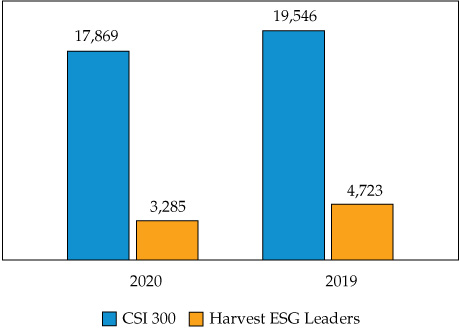
Source: Harvest Fund Management, based on reported and estimated GHG emissions and on index constituents as of 30 June 2021.
Reduce Carbon Footprint and Support Low-Carbon Transition in China’s Utilities Sector
Harvest ESG Leaders provides higher exposure to renewable power generation capacity to support the low-carbon transition and to significantly reduce carbon footprint and intensity. Harvest ESG Leaders has a power generation capacity of 100% from renewables, whereas its benchmark CSI 300 has only 35%, as shown in Figure 5 and Figure 6. Figure 7 shows power generation capacity by utility companies in the CSI 300 index.
Figure 5. Total Installed Capacity, FY20, Megawatts (MW)
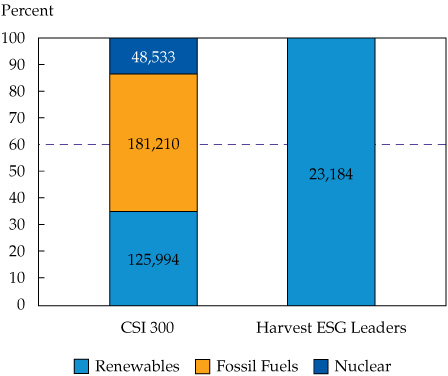
Note: This is merely an illustration of power generation capacity and does not serve as any stock recommendation or investment value assessment.
Source: Harvest Fund Management, based on index constituents as of 30 June 2021.
Figure 6. Renewable Capacity in the Utilities Sector, FY20, %
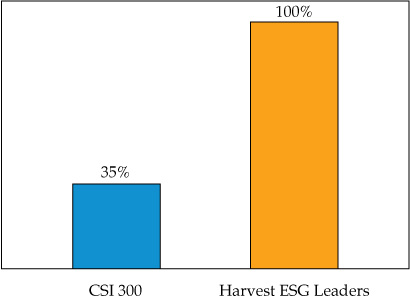
Source: Harvest Fund Management, based on index constituents as of 30 June 2021.
Figure 7. Total Installed Capacity, FY20, MW
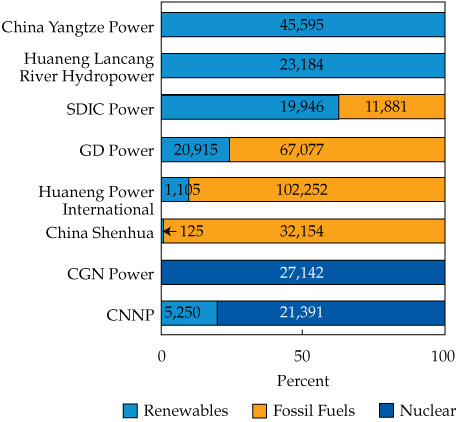
Note: CNNP refers to China National Nuclear Power Co., Ltd. This is merely an illustration of power generation capacity and does not serve as any stock recommendation or investment value assessment.
Source: Harvest Fund Management, based on index constituents as of 30 June 2021.
Engagement/Stewardship to Continuously Drive Real-World Impact and Achieve Carbon Peaking and Neutrality
As a PRI signatory, TCFD supporter, and Climate Action 100+ member, Harvest takes an active role in various forms of corporate engagement initiatives, through both collaborative engagement platforms and our own engagement programs, with a focus on the most significant emission contributors in China.
(1) Collaborative Engagement
Harvest has proactively participated in collaborative engagement, focusing on climate change and net-zero pathways. Since March 2020, Harvest has joined Climate Action 100+ and participated in the engagement team, working with Sinopec, PetroChina, and China Shenhua. As outlined in the 2020 annual plan of our CA 100+ PetroChina workgroup, Harvest has participated in internal discussions of the workgroup, set engagement targets and meeting dates, and prepared meeting materials. As a supportive institution, we have conducted several one-on-one, dedicated engagement meetings with the management of the three companies and introduced Harvest’s work on sustainable investment and ESG issues with company management. Topics and progress with PetroChina include the following:
• Low-carbon transition promise: PetroChina publicly announced in August 2020 that it will reduce carbon emissions to near zero in 2050 to cope with climate change.
• Energy transition: PetroChina plans to increase its contributions from natural gas as well as move to new and renewable energy.
• Carbon emissions disclosure: In its 2019 ESG report, published in May 2020, PetroChina disclosed its GHG emissions (Scope 1 and 2) for the first time.
Since March 2021, Harvest has formally taken the position of co-lead of the PetroChina engagement work team, leading Climate Action 100+ members to collaboratively advance climate change-related actions at the company level. The 2021 Engagement Priorities include the following:
• Carbon neutrality plan, strategy and execution paths, necessary expert support
• Strengthening GHG emissions disclosures
• Risk management and strategic planning: pushing the company to systematically take climate change into consideration and applying the TCFD framework to conduct scenario analysis
(2) Harvest-Initiated Engagement
We have our own climate change engagement program through which we aim to engage with investee companies in carbon-intensive sectors for risk-management purposes or those with business models that would benefit from the low-carbon transition in the long term.
The following describes our engagement experience with a Chinese agricultural product manufacturer to increase its climate change awareness and management approach. In this case, we fully leveraged our deep-dive fundamental and ESG research to help identify areas of improvement for engagement.
China’s agricultural products industry is highly ranked in materiality related to climate change opportunities, with a relevance score of 7, according to Harvest’s proprietary climate change risk and opportunity exposure framework. It is attractive in terms of cyclical pricing on the back of African swine fever, end of destocking, and the sector transformation in progress. The most relevant climate change issues for this industry in the local market are pollution and waste management. The agricultural product manufacturer we engaged operates as a main integrated meat producer in China. Our research indicates that it has the potential to be a future ESG leader in agribusiness. Its industry-specific climate-related issues include pollution, waste management, and climate change. Its key competitive advantages include the following:
• Best-in-class environmental performance in practice, awareness of climate change
• Continuous efforts to reinforce product safety and quality
• Strong R&D capacity
The company demonstrates industry-leading ESG practices in the agricultural product industry in China. However, its ESG information disclosure has remained unchanged and scattered despite increasing attention from regulators and investors on ESG disclosure from listed companies in recent years. Third-party ESG ratings have tended to undervalue the company’s ESG practices because of the company’s lack of public disclosure.
We initiated ESG discussions with portfolio managers and sector analysts internally first and then presented key ESG research findings at both industry and stock levels. We also arranged meetings with the company’s key ESG contact and visited two sites under construction in Shandong province to validate the company’s ESG performance and environmental management practices.
Based on our communication with the company, as well as the portfolio manager’s opinion, we then suggested the following to the company’s management team from a shareholder perspective:
• Establish the ESG data collection system as disclosed in the Carbon Disclosure Project (CDP) Climate Change questionnaire and prioritize the disclosure of the use of natural resources, especially water and energy
• Participate in third-party ESG questionnaires and communications (e.g., MSCI’s ESG corporate communications) to clarify inaccurate comments and ratings information
• Stay up-to-date on global ESG focal issues and anticipate and prepare for climate change–related policies and regulations
Consequently, the company has made plans to improve environmental and climate-related disclosures in the next reporting cycle. The board has begun to assess the need to establish an ESG subcommittee as of the end of 2020. As of May 2021, Harvest ESG Research has ranked the company as among the top 30% in A-shares and the top 20% in agricultural product A-share companies. Its energy efficiency and climate change topic score is among the top 10% of all A-shares.
Summary
By systematically integrating environmental factors into the research and investment process, developing thematic products in reducing the carbon footprint, and actively engaging with investee companies, Harvest is joining forces with global players in coping with the climate change challenges and supporting the low-carbon transition to achieve the net-zero target.
